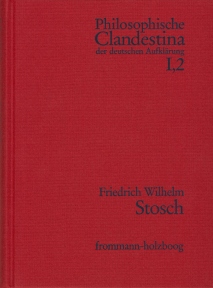You are here
Series » Philosophische Clandestina der deutschen Aufklärung » Abteilung I: Texte und Dokumente »Band 2: Friedrich Wilhelm Stosch (1648–1704)
Links / Downloads
The ›Concordia rationis et fidei‹, of which only a few copies survived, was regarded among theologians as one of the most dangerous spawn of the Enlightenment. Fritz Mauthner believed it to be »the best work of older German freethinking.« It opposes the concept of God in traditional metaphysics, the doctrine of the creation of the world as well as the doctrine of the immortality of the soul and of free will. In his metaphysical materialism, and psychology, his deterministic action theory and a non-deontological ethics and theory of natural law, Stosch at the same time presented the outline of a systematic counterdraft. Numerous theoretical approaches, theories, and frequent direct quotations from Gassendi, Spinoza, Locke (arranged by Jean Leclerc), from Cartesians such as Balthasar Bekker or Dirk van Craanen and Socinian theologians have also been included in this work. These features make it an unusually informative document of its time in the history of ideas.
Contents:
- Friedrich Wilhelm Stosch: Concordia rationis et fidei sive Harmonia philosophiae moralis (1692). Im Anhang: Übersetzung aus dem Französischen: Von dem ewigen Tode und von der Ewigkeit der Straffen der Bösen
Documents:
- Acta Stoschiana (Prozessakten der preußischen Kirchenbehörden, u.a. von Spener und Pufendorf)
- Georg Gottfried Küster: Marchiae litteratae specimen tertium (1743).
Reviews
»Ein beachtliches Stück an Aufklärung über die Aufklärung bringt dieser verdienstvolle Neudruck einer wenig bekannten [...] Schrift.«
All volumes
- Band 1: Theodor Ludwig Lau (1670–1740) – available
- Band 2: Friedrich Wilhelm Stosch (1648–1704) – available
- Band 3: Gabriel Wagner (1660–1717) – available
- Band 4: Urban Gottfried Bucher (1679–1724) – available
- Band 5: Matthias Knutzen – available
- Band 6: Anonymus [Johann Joachim Müller] (1661–1733) – available
- Subject Areas
- New Publications
- ---
- Critical Editions
- Collected Works
- Series
- Arbeiten und Editionen zur Mittleren Deutschen Literatur
- Aufklärung und Revolution
- Böhme-Forschungen
- Bibliothek 1800
- Clavis Pansophiae
- Collegium Philosophicum
- Commentaria in Aristotelem Graeca
- Doctrina et Pietas
- Editionen zur Frühen Neuzeit
- Elea
- Europäische Literatur der Frühen Neuzeit
- exempla aesthetica
- Forschungen und Materialien zur Universitätsgeschichte
- Forschungen und Materialien zur deutschen Aufklärung
- Freidenker der europäischen Aufklärung
- Freud heute
- frommann-holzboog Studientexte
- Fundamenta Historica
- Grammatica Speculativa
- Grammatica Universalis
- Kultur und Gesellschaft
- legenda
- Judith Le Soldat heute
- Medizin und Philosophie
- Melanchthon-Schriften der Stadt Bretten
- Mystik in Geschichte und Gegenwart
- Natur und Philosophie
- Neuzeit im Aufbau
- Philosophie interkulturell
- Philosophische Clandestina der deutschen Aufklärung
- Der Platonismus in der Antike
- Politische Philosophie und Rechtstheorie des Mittelalters und der Neuzeit
- problemata
- Psychoanalysis International
- Quaestiones
- Schellingiana
- Specula
- Spekulation und Erfahrung
- Supplementum Platonicum
- Volksaufklärung
- Werkstatt Bionik und Evolutionstechnik
- Bibliographies and Reference Books
- Allgemeine Zeitschrift für Philosophie
- AZP Beihefte
- Jahrbuch der Psychoanalyse
- JP Beihefte
- Steiner Studies
- Open-Access
- Single volumes
- eBooks
- Special Offers
- ---
- Authors
- Publishing house
- Links / Partner
- Paths to Philosophy
